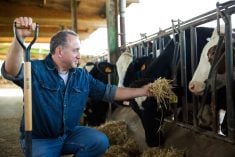Income is important in a multi-generational farm business, but sometimes the key that actually unlocks a farm’s prosperity has more to do with long-term clarity and its members’ sense of opportunity.
Therefore, if you are the second generation (SG), you must ask yourself: “Do I have a career path to ownership? Or am I just working on a promise?”
It is critical to keep in-depth track of good old-fashioned sweat equity, with appropriate record-keeping. If the SG is not receiving their value to the business in cash-based returns, then their value must be recognized in equity.
Read Also

Riding the tariff rollercoaster
Farmers are accustomed to roller-coaster years. But the current geopolitical windstorm is something else entirely. On his cattle operation near…
The value put on recording and honouring sweat equity can make or break the future of the farm by having an impact on all members’ emotional and financial well-being. This equity can come from either operating and/or land equity. Remember this formula: Value = Cash + Cash Equivalents + Equity.
What this formula captures is the value (not just hours) that each farm child brings to the business. Remember, what parents often have in farming is tremendous amounts of equity and not a lot of cash. Therefore, it is important that the SG understands that farming is an equity game not a cash game!
After the trial period (five to seven years), the farm child should be given the formal opportunity to become an owner or manager of the business. At that time, the equity owed will be transferred into assets like equipment and/or fixed-value preferred shares if incorporated. This is accomplished tax-free by having the parents transfer some of their preferred share equity to their farming children.
A sport analogy that can be utilized here: The farming child has finally been drafted and now is entering into the major leagues, and this is their signing bonus.
Remember, equity transferred is equity earned. If a child decides in the future to exit the operation, a severance agreement needs to exist where the payout is structured. For example, 50 per cent down and 50 per cent for five years at zero per cent interest. The SG should never feel trapped!
Since transferred equity is subject to the Matrimonial Property Act, remember that preferred shares do not increase in value and thus are exempt from matrimonial property rules (in most provinces). In other words, in case of divorce, the departing spouse is not able to capitalize on this asset transfer.
Now, to keep the teeter-totter even, if the SG is expecting a fair return on their work, everyone has to be ready for the hard discussions coming back from the first generation (FG) involving how much they have assisted the SG to get ahead.
Why is this an issue? It happens on every family farm and gives the parents pride in being able to help their successors. The concern involves false economies, which arise when two generations farm separately but yet agronomically together.
False economies are very common where the SG does not reimburse the parents’ business at fair market value for access to land and/or machinery that exceeds their labour contributions. Over time, this skews the economic viability of the parent’s business, especially when the SG steadily increases their acres through third-party rented land. This format can create misunderstood expectations, false economics and false independence!
Recommendation: Calculate the actual benefit of this false economy. Calculate the benefit that each child receives and then a percentage of that benefit should be retained for business purposes, such as equipment purchases. Eventually, the SG should be buying equipment at a rate equal to their land base.
If this shared ownership does not occur over time, the parents will always own the equipment and the SG will not have pride of ownership. Therefore, by tracking the benefit, this allows the SG to increase their equipment ownership and actually pay for it, thus eliminating part of the false economy syndrome.
Neither facet of these two generational concerns should be taken as finger-pointing areas of contention. Rather, they’re a way to unlock and address some of those unspoken and/or unknown expectations and realities. I guarantee you the SG will be shocked at the hard, economic lesson their calculated benefit addresses and what their reality would be like without that help
Similarly, the FG must recognize that without the SG’s blood, sweat and tears, their operation would not be where it is today. Transferring equity is a great way to respect those efforts and to begin to transfer the business over time, creating a clear path to ownership.
Through GSR Consulting, Annessa Good contributes to CTEAM segments on succession planning. In addition, AME and GRS collaborated on a one-day program, The ABC’s of Intergenerational Succession Planning. A unique component of this is that Good and her father, Merle Good, collaborate in the program reflecting perspectives from both generations involved in the succession process. Good says her focus and passion is to ensure business opportunity and operational clarity for the younger generation.















